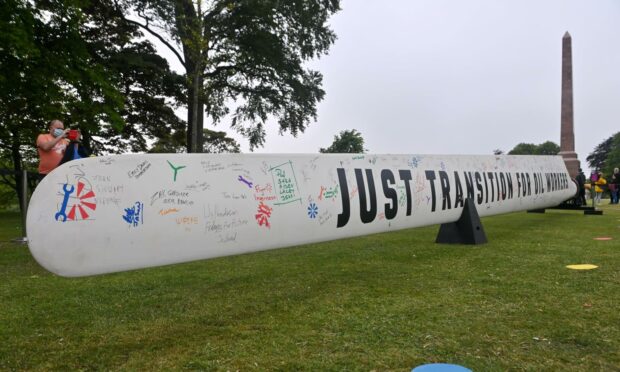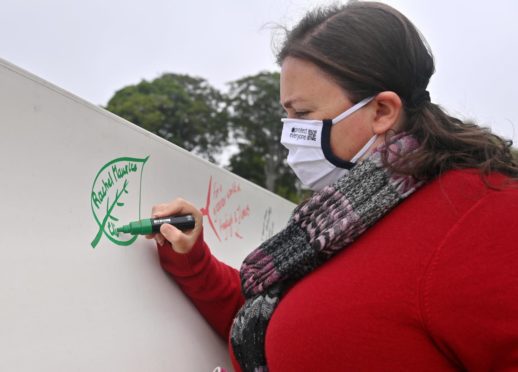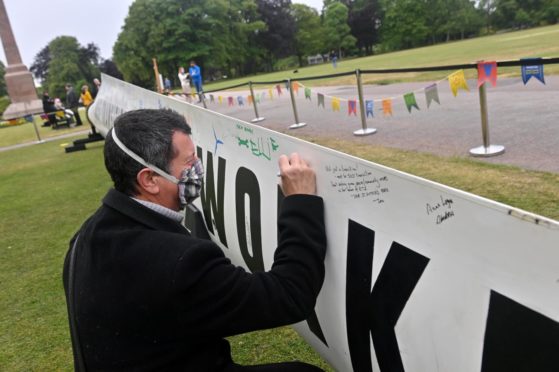Campaigners have brought a 42ft wind turbine blade to Aberdeen as part of the Greenpeace Just Transition Tour.
Members of the public were invited to sign the blade to show their support of a fair energy transition deal during the event at Duthie Park on Saturday.
Greenpeace, Friends of the Earth Scotland and Platform have said they are passionate about their shared goal of ensuring oil workers can gain easy access to sustainable green jobs in renewable energy.
Sam Chetan-Welsh, a political campaigner for Greenpeace, was one of the representatives at the event, spreading awareness and talking to locals.
He said: “We’ve brought this wind turbine here today so we can talk about Just Transition, and getting the government, both in Scotland and at Westminster, to support offshore workers to be able to transition away from oil and gas.
“We know that because of the climate emergency we need to be moving out of oil and gas as quickly as possible, but in a way that is equitable and doesn’t leave communities behind that have kept the lights on for so many years.
“We’re getting people to sign the blade saying that they support the transition for oil workers to retrain and reskill. So far, there has been an amazing response.”
Almost 12,000 people have already signed a petition on the Greenpeace website asking the first minister to take action.
The campaigners believe that workers need more power over their jobs and their futures, while communities should have more say over investments and who benefits from them.
Response in Aberdeen
Despite the lack of sunshine there were plenty of dog walkers, joggers and families spending their Saturday in Duthie Park – and the 42ft turbine blade caught many eyes.
People stopped to talk with campaigners and share their own views before signing the blade. Signatures from all over the UK now cover both sides, including several from yesterday’s tour stop in Inverness.
Martin Fraser, 36, lost his job in the oil industry during the downturn in 2015 and now runs his own external cleaning business.
He said: “I think it sounds like a good cause and it’s definitely a sensible thing to be discussing.
“There’s going to be a lot of guys out of work when the oil industry does blow so it makes sense to retrain and speak to them about renewable energy, rather than just being cut off.
“A lot of people in the industry are highly skilled but will potentially have no work, so it makes sense that they should be able to put their skills into something that is needed now and into the future.”
Rachel Maurice, 40, heard about today’s event through her volunteering work with Aberdeen Climate Action.
She said: “I wish there were more collective actions like this as we definitely need to make more people think about what is going on. Anyone who just happens to be walking past can stop and learn about the campaign.
“It spreads awareness and starts conversations. People often don’t feel involved in decision making, but signing names today is a way for us to be a part of something and show support.”
Talking to oil workers
The campaigners said they have had a lot of “interesting conversations” with locals who work in the oil industry.
Mr Chetan-Welsh continued: “People we’ve spoken to who have worked in the oil industry have been very supportive of our work.
“The people who are in the industry are the people wo understand. Workers tell us that they feel a sense of it being in decline and they would like to see government step in and help them move to other industries.
“When we’ve done surveys of workers, we’ve not found that they’re emotionally connected to oil and gas, they just want secure work so they can look after their families, and that can be in any industry.
“It’s a big job we’ve got on our hands, helping this transition happen, and that’s one of the reasons we’re starting conversations with people, to turn any skepticism into support.”
What do campaigners want from the government?
The charity representatives at Duthie Park today said it was “imperative” that the government step in to make the transition as smooth as possible.
When asked what response they are hoping to get from the government, Mr Chetan-Welsh said: “We hope to see proactivity and action, we feel they have been sitting on their hands and talking a big talk as though they know what it requires.
“What we’re finding instead is that offshore workers are paying out big amounts of money themselves to be able to transition, for example, into renewable energy.
“The pandemic has been another in a series of crisis, which highlights the need for proactivity from governments.
“They can’t leave the workers to dangle and be subject to an industry that is constantly fluctuating and tied to global oil prices that workers can’t control.
“So, we need to see policy change, we need to see money, and most of all we need to see proper commitments from both governments.”








